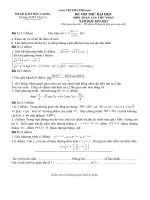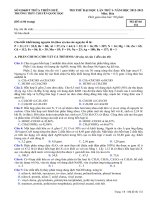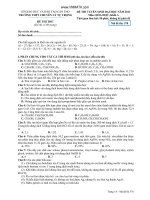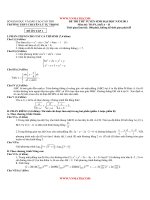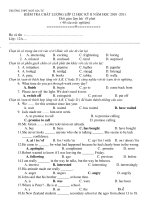KỲ THI HSG LẦN THỨ 16 NĂM HỌC 2010 – 2011 - TRƯỜNG THPT CHUYÊN LÝ TỰ TRỌNG pdf
Bạn đang xem bản rút gọn của tài liệu. Xem và tải ngay bản đầy đủ của tài liệu tại đây (142.17 KB, 8 trang )
1
SỞ GIÁO DỤC VÀ ĐÀO TẠO TP.CẦN THƠ
TRƯỜNG THPT CHUYÊN LÝ TỰ TRỌNG
KỲ THI HSG
LẦN THỨ 16 – NĂM HỌC 2010 – 2011
ĐỀ THI ĐỀ NGHỊ MÔN
Thời gian làm bài : 180 phút
GRAMMAR & VOCABULARY (7m)
I. Choose the word or phrase that best fits each gap of the sentence. (1m)
1. It was decided that the cost of the project would be _____ and so it was abandoned.
A. repressive B. prohibitive C. restrictive D. exclusive
2. We ____ up a friendship the very first time we met.
A. struck B. launched C. cropped D. settled
3. He made a number of _____ remarks about my cooking, which upset me.
A. slashing B. stabbing C. chopping D. cutting
4. The truant was ______ from school for unbecoming behavior.
A. dispelled B. repelled C. expelled D. compelled
5. The actor was so nervous that he could only remember small ______ of dialogue.
A. shreds B. pieces C. patches D. snatches
6. He looks very aggressive and threatening, and his soft, gentle voice is rather ______.
A. disembodied B. disconcerting C. dismissive D. discordant
7. The police ______ a good deal of criticism over their handling of the demonstration.
A. came in for B. brought about C. went down with D. opened up
8. Despite all the interruptions, he ______ with his work.
A. stuck at B. held on C. hung out D. pressed on
9. You could make a formal complaint to the committee, but I wouldn’t go down that ____ if I were
you.
A. lane B. street C. avenue D. road
10. When the funds finally _____, they had to abandon the scheme.
A. faded away B. clamped down C. petered out D. fobbed off
II. Choose the underlined part in each sentence that needs correcting. (1m)
1. (A) It was Isadora Duncan (B) who was responsible for many of the (C) new innovations that
have made modern dance (D) different from classical ballet.
2. Although you must get off while the bus is (A) being cleaned, you may (B) leave your suitcases
and (C) other belongings (D) laying on your seat.
3. One should try to (A) reconcile his views with (B) those (C) of his company when they are (D)
on conflict.
4. His recommendation that the Air Force (A) investigates the UFO sighting (B) was approved (C)
by the commission and referred (D) to the appropriate committee.
5. (A) This is the athlete (B) whom everyone (C) says will win the gold medal at the (D) winter
Olympic Games.
6. (A) Because the expense of traditional fuels and the concern that (B) they (C) might run out, we
(D) have been investigating alternative sources of power.
7. Digital clocks, however precise, (A) they cannot (B) be (C) perfectly accurate because (D) the
earth’s rotation changes slightly over the year.
8. Only seventeen (A) on one hundred (B) business calls (C) get through to the correct person on
(D) the first attempt.
2
9. You can boost the sales of a product (A) faster (B) by increasing (C) its advertising budget than
(D) to improve the product itself.
10. The fact that (A) no fossilized remains of a plant or animal (B) has been found on the Grand
Canyon (C) supports the claim that (D) it existed before life on this planet.
III. Choose the best word that fits each gap of the passage. (1m)
National Health Service (NHS) (1) ________ ambulances are available and free for cases of
sudden (2) ________ or collapse, for accidents and for doctors’ urgent call. Special (3) _________
services, such as free dental treatment and (4) _______ and immunization of children against certain
(5) ________ diseases, are provided under the NHS to safeguard the health of (6) _______ women and
young children. Free family planning advice and (7) ________ is available from general practices
(GPs) and family planning clinics. Nation-wide screening programmes for breast canner and cervical
cancer are available to the most (8) _______ age groups among women. Improvements in the provision
and (9) ________ of cancer services are a major priority. The blood (10) _______ services collect over
2.5 million donations a year from voluntary unpaid donors.
1. A. emergent B. emergency C. urgent D. urgency
2. A. illness B. disease C. pain D. sore
3. A. prevent B. preventing C. preventive D. prevention
4. A. vaccine B. vaccinate C. vaccinating D. vaccination
5. A. infect B. infecting C. infection D. infectious
6. A. pregnant B. pregnancy C. expecting D. expectant
7. A. treat B. treatment C. treating D. maltreatment
8. A. unsuspecting B. susceptible C. susceptibility D. susceptibly
9. A. avail B. available C. availability D. unavailable
10. A. transfuse B. transfused C. transfusing D. transfusion
IV. Choose the correct verb tense for each gap of the passage. (2m)
This time last year I (1) ______ in the rain along a country road in France with a friend of mine.
We (2) _____ to go on a cycling holiday in Normandy. Neither of us (3) ______ to France before, but
we (4) _____ some French from our time at school and we (5) _____ to brush up on the basics. Now
we (6) _____ if we (7) _____ the right decision. We (8) _____ our route carefully in advance, but we
(9) ______ one important thing, the weather. It (10) _____ solidly since our arrival and that night we
(11) ______ sleeping in the waiting room at a railway station. Then the next morning as we (12)
______ down a steep hill my bike (13) _____ on the wet road and I (14) ______. I (15) ______
immediately that I (16) ______ my arm, and after a visit to the local hospital I (17) ______ the next
train to Calais for the ferry home. Unfortunately my parents (18) ______ me home for a fortnight, and
(19) _____ away on holiday. So I (20) _____ a miserable couple of weeks alone, reading Teach
Yourself French.
1. A. cycled B. was cycling C. had cycled D. had been cycling
2. A. decided B. have decided C. had decided D. had been deciding
3. A. have been B. had been C. went D. was going
4. A. know B. knew C. have known D. had known
5. A. managed B. have managed C. would manage D. had managed
6. A. wonder B. are wondering C. will wonder D. were wondering
7. A. make B. made C. have made D. had made
8. A. planned B. have planned C. had planned D. had been planning
9. A. forgot B. had forgotten C. have forgotten D. were forgetting
3
10. A. has rained B. has been raining C. was raining D. had rained
11. A. ended up B. had ended up C. have ended up D. would end up
12. A. rode B. were riding C. had ridden D. had been riding
13. A. skidded B. was skidded C. was skidding D. was being skidded
14. A. fell off B. was falling off C. was fallen off D. had fallen off
15. A. realize B. have realized C. realized D. had realized
16. A. broke B. have broken C. had broken D. had been breaking
17. A. caught B. have caught C. had caught D. would catch
18. A. didn’t expect B. weren’t expecting C. haven’t expected D. hadn’t expected
19. A. went B. had gone C. were going D. have gone
20. A. spent B was spending C. have spent D. have been spending
V. Choose the correct preposition/ particle for each gap of the passage. (1m)
The Moscow metro system is over sixty years old. Sometimes called “the people’s underground
palace”, it has stood (1) ____ well to the passing of time. It carries nine million passengers a day at an
average speed of 42 kilometers per hour, and now, even though it has run (2) ____ of money, it still
offers impressive examples of past splendor. Tourists from all over the world come to look at the
stations lined with granite and marble and decorated with mosaics and chandeliers. Some of the names
have changed: for example, Marx Prospekt has turned (3) ____ Hunter’s Row. Some Muscovites find it
hard to take (4) ___ the changes, but they are justly proud of their underground and want to look (5)
____ it. Recently a strike was threatened, to force the government to invest in the system. The plan
came (6) ____, and so a new line and new stations will be built.
The Moscow metro stands (7) ____ among its international competitors for being almost
completely free of advertising. Although that will change soon, transport managers have promised to
see (8) ____ it that any advertising will be done tastefully. Wherever you go in the world, you won’t
come (9) ____ a grander or more impressive underground system. Whether you’re a local, seeing your
friends (10) ____ or traveling to work, or a tourist, visiting Moscow for the first time, spare a moment
to appreciate the works of art all around you, before going on with your journey.
1. A. up B. out C. by D. in
2. A. away B. down C. up D out
3. A. back B. into C. out D. against
4. A. up B. down C. in D. on
5. A. round B. into C. for D. after
6. A. off B. out C. up D. in
7. A. over B. out C. up D. for
8. A. through B. to C. off D. round
9. A. up B. out C. across D. to
10. A. forward B. off C. out D. away
VI. Choose the correct article for each gap of the passage. (1m)
People from (1)…… cultures find some of (2)…… different customs of the U.S. difficult to get
used to. Japanese students frequently say that Americans are much more physical than they would like.
They feel uncomfortable when they get (3)…… amiable hug or even just (4)…… pat on (5)… back.
English visitors complain about (6)… excessive friendliness of Americans. They recount tales of
parking lot attendants or gas station clerk striking up (7)…… conversation with them about long lost
ancestors from (8) … “motherland”. However, (9)… friendliness and physical affection are part of
(10)……. American profile, even if they are hard for some to adjust to. Being aware of differences
such as these can only help us all to get along better.
4
1. A. B. a C. an D. the
2. A. a B. the C. D. an
3. A. the B. C. an D. a
4. A. B. an C. the D. a
5. A. an B. a C. the D.
6. A. B. the C. an D. a
7. A. a B. an C. the D.
8. A. a B. the C. D. an
9. A. an B. a C. D. the
10. A. B. an C. a D. the
READING
I. Read the following passage carefully and then decide whether the following statements are
True (T) or False (F) (1m)
Scientists claim that air pollution causes a decline in the world’s average air temperature. In order
to prove that theory, ecologists have turned to historical data in relation to especially huge volcanic
eruptions. They suspect that volcanoes affect weather changes that are similar to air pollution. One
source of information is the effect of the eruption of Tambora, a volcano in Sumbawa, the Dutch East
Indies, in April 1815. The largest recorded volcanic eruption, Tambora threw 150 million tons of fine
ash into the stratosphere. The ash from a volcano spreads worldwide in a few days and remains in the
air for years. Its effect is to turn incoming solar radiation into space and thus cool the earth. For
example, records of weather in England show that between April and November 1825, the average
temperature had fallen 4.5F. During the next twenty four months, England suffered one of the coldest
periods of its history. Farmers’ records from April 1815 to December 1818 indicate frost throughout
the spring and summer and sharp decreases in crop and livestock markets. Since there was a time lag of
several years between cause and effect, by the time the world’s agricultural commodity community had
deteriorated, no one realized the cause.
Ecologists today warn that we face a two-fold menace. The ever-present possibility of volcanic
eruptions, such as that of Mt. St. Helens in Washington, added to man’s pollution of the atmosphere
with oil, gas, coal and other polluting substances, may bring us increasingly colder weather.
1. It is believed that the earth gets hotter when volcanoes erupt.
2. Because incoming radiation is turned into space, there is a decline in the world’s average air
temperature.
3. The effects of Tempora’s eruption were evidence of pollution’s cooling the earth.
4. The effects of Tempora’s eruption affected only Sambawa, the Dutch East Indies.
5. The cause of cold weather in England from 1815 to 1818 was volcanic ash in the atmosphere.
6. The cold weather in England from 1815 to 1818 seriously affected crop and livestock
production.
7. No one realized the cause of the deterioration of the world’s agricultural commodity market
because weather forecasts were inaccurate.
8. The deterioration of the world’s agricultural commodity community was caused by a long delay
between cause and effect.
9. No one realized the cause of the deterioration of the world’s agricultural commodity market
because there was a long delay between cause and effect.
10. If, as some scientists predict, the world ends in ice, the cause might be modern man’s pollution
of the air and volcanic eruptions.
5
II. Read the passage and choose the best answer (1m)
As Christmas evolved in the United States, new customs were adopted and many old ones were
reworked. The legend of Santa Claus, for example, had origins in Europe and was brought by Dutch
settlers to New York in the early 18
th
century. Traditionally, Santa Claus – from the Dutch Sinter Klaas
– was depicted as a tall, dignified, religious figure riding a white horse through the air. Known as Saint
Nicholas in Germany, he was usually accompanied by Black Peter, an elf who punished disobedient
children. In North America he eventually developed into a fat, jolly old gentleman who had neither the
religious attributes of Saint Nicholas nor the strict disciplinarian character of Black Peter.
Santa’s transformation began in 1823, when a New York newspaper published the poem A Visit
from Saint Nicholas, which Clement Clark Moore had written to amuse his daughter. The poem
introduced many Americans to the story of a kindly saint who flew over housetops in a reindeer-drawn
sleigh. Portraits and drawings of Santa Claus by American illustrator Thomas Nast further strengthened
the legend during the second half of the 19
th
century. Living at the North Pole and assisted by elves, the
modern Santa produced and delivered toys to all good children. By the late 19
th
century he had become
such a prominent figure of American folklore that in 1897, when Virginia O’Hanlon wrote to the New
York Sun newspaper asking if Santa was real, she received a direct answer: “Yes, Virginia, there is a
Santa Claus”.
1. Who brought the legend of Santa Claus to the USA according to the passage?
A. Sinter Klaas B. Saint Nicholas
C. A German D. Dutch settlers
2. Santa Claus was traditionally described as a
A. tall man who could walk through the air
B. fat, jolly, old man
C. religious figure
D. fat man riding a white horse
3. Santa Claus in North America was depicted as
A. a man with the strict disciplinarian character of Black Peter
B. a good old man with less religious character
C. one with religious attributes of Saint Nicholas
D. a jolly man on horseback
4. Who was Black Peter?
A. an elf accompanying Saint Nicholas
B. an elf who rode a white horse
C. one of the disobedient children
D. a popular traditional figure
5. What word is closest in meaning to attributes?
A. symbols of a person B. natural qualities
C. effects D. outer appearance
6. Where did the legend of Santa Claus come from?
A. the North Pole B. Europe
C. North America D. the City of New York
7. 1823 was mentioned as a year when
A. Clement Clark Moore wrote his first poem
B. Clement Clark Moore’s poem made him popular
C. Saint Nicholas visited New York
D. the image of Santa Claus was transformed
6
8. According to Clement Clark Moore’s poem
A. Santa Claus had nothing different in appearance from the traditional one
B. Santa Claus had wings and could fly
C. Santa Claus liked poetry
D. Santa Claus was a kindly saint who flew over housetops in a sleigh
9. The answer Yes, Virginia, there is a Santa Claus is an illustration for the fact that
A. the New York Sun was popular with children
B. Santa Claus was a prominent figure at that time
C. newspapers are unreliable
D. Virginia O’Hanlon was a reader of the New York Sun
10. Which of the following statements is TRUE?
A. Santa Claus was an imaginary old man created by artists based on traditional figures
B. Living in the North Pole, Santa Claus visited children at Christmas
C. Santa Claus was a real figure living in northern America
D. Santa Claus was a story based on Saint Nicholas and Black Peter
III. Choose the best word from A, B, C or D that best fits each blank (1.5m)
THE MISANTHROPIST
The latest production at the Playhouse is a modern version of Molière’s great play of 1666, Le
Misanthrope. As in many of his other comedies, Molière takes an aspect of human nature and (1)
………. it, so creating a rich variety of comic scenes and situations. In the past, many directors have (2)
………. to stress the serious (3) ………. of the play, but here, (4) ………. Jack Long has kept the one
light and (5) ……….
Peter Fowler plays the central character, Alceste. He is a man who has no (6) ………. of people’s
emotion. Her refuses to (7) ………. any of the small (8) ………. lies that are necessary in normal
society; he doesn’t mind (9) ………. people and ends up hurting the (10) ………. of almost everyone
he meets. It would be easy to feel some sympathy for Alceste – after all, this only fault is that he is too
(11) ………. – but Peter Fowler (12) ………. to make him look a rather ridiculous figure.
There are some excellent performances from other (13) ………. The long-suffering Philinte (Sam
Kirby) comes across as a very sympathetic character. The romantic interest is provided by Celimente
(Amanda Barter), although in the end she (14) ………. to persuade him to change his ways.
The Misanthropist is on every night for the next three weeks (15) ………. Sundays.
1. A. increases B. grows C. expands D. exaggerates
2. A. used B. selected C. tended D. leaned
3. A. side B. angle C. view D. edge
4. A. direct B. directive C. direction D. director
5. A. fun B. pleasant C. comic D. amused
6. A. knowledge B. understanding C. conscience D. thought
7. A. speak B. say C. tell D. talk
8. A. green B. red C. grey D. white
9. A. upsetting B. injuring C. wounding D. damaging
10. A. sensations B. emotions C. spirits D. feelings
11. A. honest B. true C. right D. accurate
12. A. succeeds B. can C. achieves D. manages
13. A. casts B. actors C. players D. roles
14. A. fails B. misses C. mistakes D. drops
15. A. apart B. without C. unless D. except
7
IV. Choose from the phrases A-H the one which fits each gap (0.5m)
In many regions of the world, people wear traditional costumes at festivals or holidays, and
sometimes more regularly. Americans, however, (1) ……… a long tradition. Except for the varied and
characteristic clothing of Native American peoples, dress in the United States (2) ……… or based on
the careful preservation of decorative patterns and crafts. American dress is derived from the fabrics
and fashions of the Europeans who (3) ……… in the 17
th
century. Early settlers incorporated some of
the forms worn by indigenous peoples, such as moccasins and garments made from animal skins. For
instance, Benjamin Franklin is famous for flaunting a raccoon cap when he traveled to Europe. In
general, however, fashion in the United States (4) ……… Despite the number and variety of
immigrants in the United States, American clothing has (5) ……… was often rapidly exchanged for
American apparel.
A. has rarely been specific to a certain region
B. are not as comfortable as they used to
C. do not have distinctive folk attire with
D. tended to be homogenous, and attire from an immigrant’s homeland
E. began colonizing the country
F. was not at all like what had been described in
G. adapted and modified European styles
H. are used to serve the purpose of
WRITING (6m)
I. Write a second sentence as similar in meaning as the first one. Use the given words (1m)
1. When I started work, I was so inexperienced that I couldn’t send a fax. CLUE
2. What you have been saying is quite irrelevant. BEDISE
3. Please stop criticizing everybody! DOWN
4. We don’t expect that the missing climbers have survived. HOLD
5. Helen’s report is rather unclear in places. LACKING
6. Everybody in the audience stood to applaud the actor’s performance. STANDING
7. Taxpayers had to pay the cost of the privatization plan. FOOT
8. The fact that he will never race again is something he cannot accept. TERMS
9. A government official leaked the story to the world press. WIND
10. Building societies will have to guard against their rivals. LAURELS
II.
The chart below shows the amount of leisure time enjoyed by men and women of different
employment status from 1998 to 1999.
Write a report describing the information shown below. You should write about 150 words.
8
0
10
20
30
40
50
60
70
80
90
Employed
full-time
Unemployed Housewives
Males
Females
III. Write about the following topic (3m)
Some people say that studying the English language in an English-speaking country is the best
but not the only way to learn the language.
Do you agree or disagree with this statement? Write a paragraph of 200 words to express your
opinion.
The end

